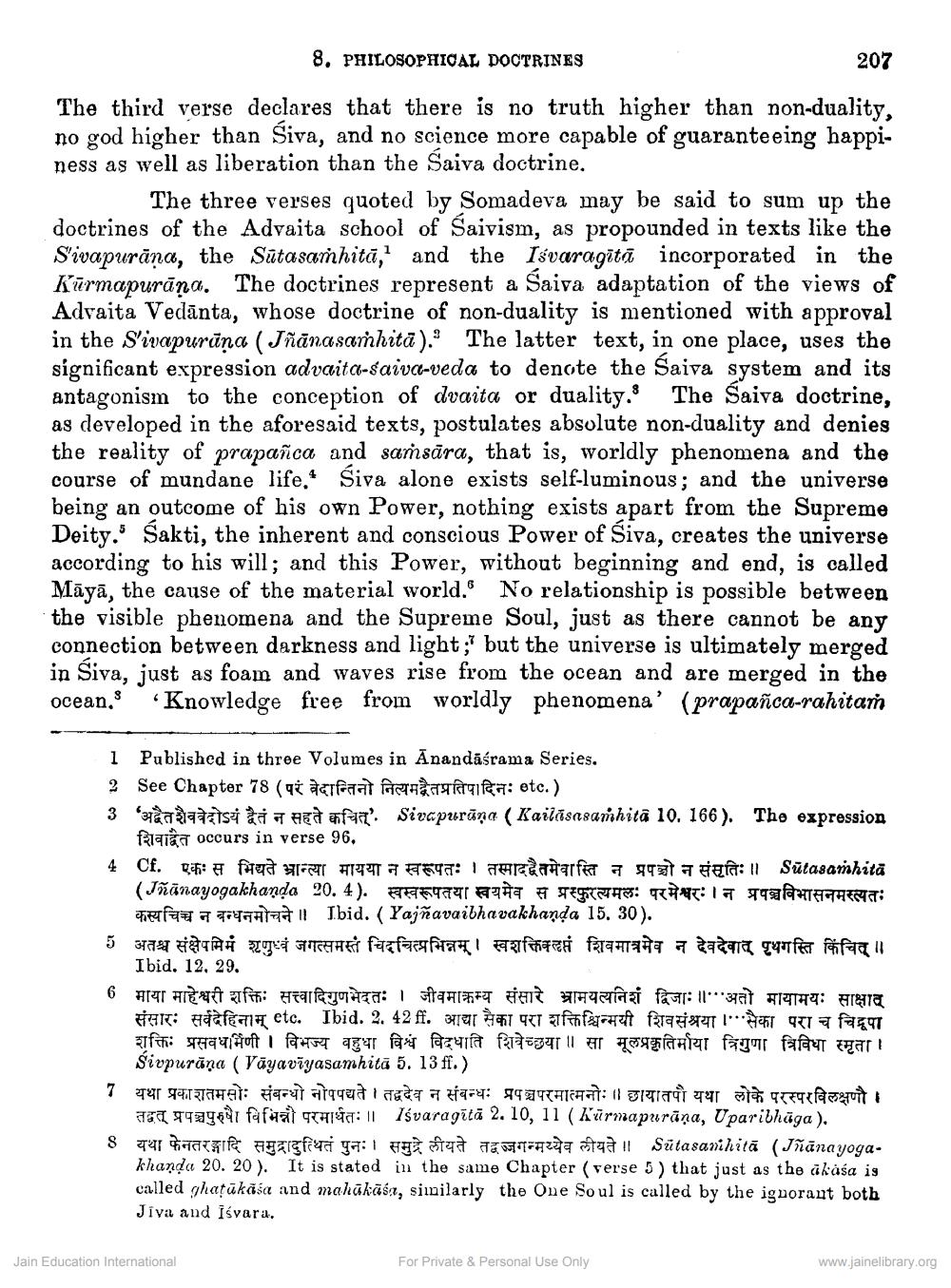________________
8. PHILOSOPHICAL DOCTRINES
207
The third verse declares that there is no truth higher than non-duality, no god higher than Šiva, and no science more capable of guaranteeing happiness as well as liberation than the Saiva doctrine.
The three verses quoted by Somadeva may be said to sum up the doctrines of the Advaita school of Saivism, as propounded in texts like the S'ivapurana, the Sūtasaṁhita, and the Távaragītā incorporated in the Kūrmapurāna. The doctrines represent a Saiva adaptation of the views of
aita Vedānta, whose doctrine of non-duality is mentioned with approval in the Sivapurāna (Jñānasaṁhita).' The latter text, in one place, uses the significant expression advaita-saivce-veda to denote the Saiva system and its antagonism to the conception of dvaita or duality. The Saiva doctrine, as developed in the aforesaid texts, postulates absolute non-duality and denies the reality of prapanca and saṁsāra, that is, worldly phenomena and the course of mundane life. Siva alone exists self-luminous; and the universe being an outcome of his own Power, nothing exists apart from the Supreme Deity. Sakti, the inherent and conscious Power of Siva, creates the universe according to his will; and this Power, without beginning and end, is called Māyā, the cause of the material world. No relationship is possible between the visible phenomena and the Supreme Soul, just as there cannot be any
a between darkness and light; but the universe is ultimately merged in Siva, just as foam and waves rise from the ocean and are merged in the ocean. “Knowledge free from worldly phenomena' (prapanca-rahitan
1 Published in three Volumes in Anandāśrama Series. 2 See Chapter 78 (qi aceaat T raian: etc.) 3 patati di 7 mg afart. Sivcpurūna ( Kailāsasaṁhita 10. 166). The expression
felqiga occurs in verse 96, 4 Cf. : afya na HITT 7 TE97: 1 Terharfe 5 gat hæfa: 11 Sūtasamhita (Jžānayogakhanda 20. 4). FETTU
TEAS: #4:17 TaHE THESIT: htfa 7 974 Hal Ibid. ( Yajňavaibhavakhanda 15. 30). 5 अतश्च संक्षेपमिमं शृणुध्वं जगत्समस्तं चिदचित्प्रभिन्नम् । स्वशक्तिक्लप्तं शिवमात्रमेव न देवदेवात् पृथगस्ति किंचित् ॥
Ibid. 12. 29. माया माहेश्वरी शक्तिः सत्त्वादिगुणभेदतः । जीवमाक्रम्य संसारे भ्रामयत्यनिशं द्विजाः॥'अतो मायामयः साक्षात् HEIT: Hafetih etc. Ibid. 2. 42 ff. ar 91 fhfaqet fast I T OTT fant शक्तिः प्रसवधर्मिणी । विभज्य बहुधा विश्व विदधाति शिवेच्छया । सा मूलप्रकृतिर्माया त्रिगुणा त्रिविधा स्मृता।
Sivpurăņa (Vāyavīyasamhita 5. 13 ff.) 7 यथा प्रकाशतमसोः संबन्धो नोपपद्यते । तद्वदेव न संबन्धः प्रपञ्चपरमात्मनोः ।। छायातपौ यथा लोके परस्परविलक्षणौ ।
167 Tag a fafaat Tha: 11 Isvara gitā 2. 10, 11 (kürmapurāņa, Uparibhāga). T azaif Furgi : 1 ya Taaza !! Sütasanihitä (Jžānayogakhanda 20. 20). It is stated in the same Chapter (verse 5) that just as the akasa is called ghatūkāša and mahākāśa, siinilarly the One Soul is called by the ignorant both Jiva and iśvara.
Jain Education International
For Private & Personal Use Only
www.jainelibrary.org




